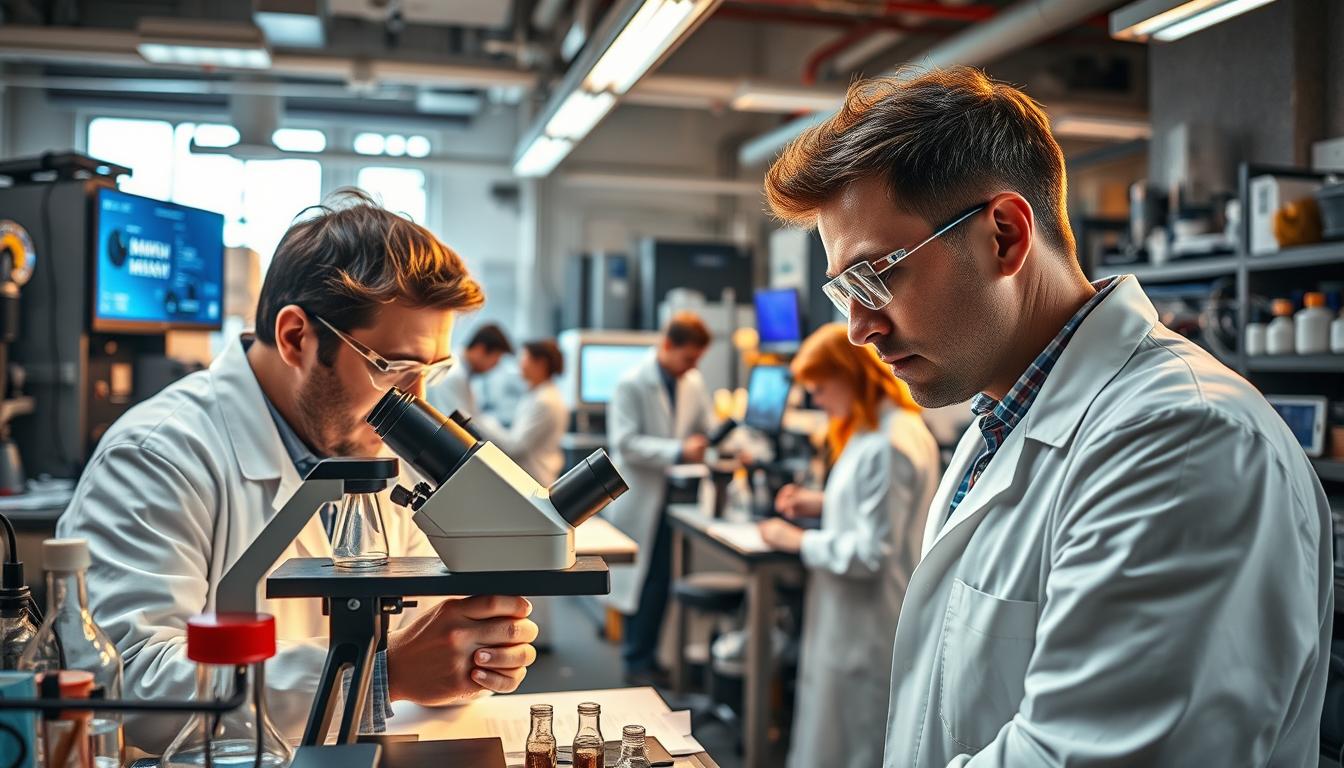
Scientific discoveries are revolutionizing our world, transforming the way we live, work, and interact with one another.
Advances in technological innovation have led to significant breakthroughs in various fields, including medicine, technology, and sustainability. These developments are not only improving our daily lives but also paving the way for a more sustainable future.
As we continue to push the boundaries of what is possible, it is clear that scientific discoveries will remain at the forefront of shaping our world.
Key Takeaways
- Scientific discoveries are driving technological innovation.
- Advances in medicine are improving global health.
- Sustainability is becoming increasingly important.
- Technological innovation is transforming industries.
- Scientific breakthroughs are paving the way for a better future.
A Jornada da Descoberta Científica
The path to groundbreaking scientific discoveries is paved with curiosity, experimentation, and innovation. Scientific progress is a multifaceted endeavor that relies on the scientific method to advance our understanding of the world.
O Método Científico e sua Evolução
The scientific method has been the backbone of scientific inquiry, guiding researchers from hypothesis to theory. Over time, this method has evolved to incorporate new technologies and methodologies, enhancing its effectiveness.
Da Hipótese à Teoria Comprovada
A hypothesis is tested through rigorous experimentation, and if validated, it can become a theory. This process is fundamental to the advancement of scientific knowledge.
Colaboração Científica Global
Research collaboration across borders is crucial in addressing complex global challenges. By sharing knowledge and resources, scientists can accelerate discovery and innovation.
Pontes Entre Pesquisa Básica e Aplicada
The connection between basic and applied research is vital for translating scientific findings into practical applications. Basic research lays the foundation, while applied research drives innovation.
O Papel das Universidades e Centros de Pesquisa
Universities and research centers play a pivotal role in fostering scientific advancement. They provide the infrastructure and environment necessary for cutting-edge research.
Financiamento e Prioridades Científicas
The allocation of funding and the setting of scientific priorities significantly influence the direction of research. Strategic funding can accelerate progress in critical areas.
Da Teoria à Prática: Como as Descobertas Científicas Estão Mudando o Mundo
Transforming scientific theories into practical solutions is a multifaceted process that relies on innovation and collaboration. This process involves various stakeholders, including researchers, industry leaders, and policymakers, who work together to bring new technologies to the market.
O Ciclo de Inovação Tecnológica
The cycle of technological innovation is a continuous process that begins with basic research and ends with the commercialization of new products or services. It involves several stages, including research and development, prototyping, testing, and scaling up production.
Casos de Sucesso: Da Bancada ao Mercado
There are numerous examples of successful technology transfer, where scientific discoveries have been transformed into commercial products. For instance, the development of the polio vaccine by Jonas Salk is a classic example of how basic research can lead to life-saving technologies.
Tempo de Maturação das Descobertas
The time it takes for a scientific discovery to mature into a commercial product can vary significantly. Factors such as the complexity of the technology, market demand, and regulatory requirements can influence the maturation process.
Ecossistemas de Inovação e Transferência de Tecnologia
A robust innovation ecosystem is essential for facilitating the transfer of technology from academia to industry. This ecosystem includes various components, such as research institutions, startups, venture capitalists, and government agencies, which work together to support the development and commercialization of new technologies.
Parcerias Público-Privadas
Public-private partnerships play a crucial role in supporting the development and commercialization of new technologies. These partnerships can provide funding, expertise, and resources that are essential for bringing new products to market.
Startups e Spinoffs Acadêmicas
Startups and academic spinoffs are increasingly important vehicles for technology transfer. These companies are often founded by researchers who have developed innovative technologies and are looking to commercialize them.
Revoluções na Medicina: Salvando e Prolongando Vidas
Advances in genomics and precision medicine are revolutionizing treatment options. The field of medicine is rapidly evolving, with new technologies and discoveries transforming patient care.
Genomics and Precision Medicine
Genomics has enabled healthcare providers to tailor treatments to individual patients based on their genetic profiles. This approach has shown significant promise in treating complex diseases.
CRISPR and Gene Editing
The CRISPR technology allows for precise editing of genes, holding potential for treating genetic disorders. CRISPR’s precision in editing genes has opened new avenues for research into genetic diseases.
Personalized Cancer Treatments
Precision medicine has led to the development of personalized treatments for cancer, improving patient outcomes. Targeted therapies are being designed to attack specific cancer cells, reducing harm to healthy tissues.
Advanced Diagnostic Technologies
Diagnostic technologies have seen significant advancements, enabling earlier and more accurate detection of diseases.
Medical Imaging and Artificial Intelligence
The integration of AI with medical imaging has enhanced diagnostic accuracy. AI algorithms can analyze images to detect abnormalities that may be missed by human clinicians.
Biosensors and Remote Diagnostics
Biosensors and remote diagnostic tools are allowing for continuous monitoring of patients’ health, enabling timely interventions. These technologies are particularly beneficial for managing chronic conditions.
mRNA and the Vaccine Revolution
The success of mRNA vaccines has marked a significant milestone in vaccine technology. mRNA vaccines offer a flexible platform for rapid development of vaccines against emerging pathogens.
Some key benefits of mRNA technology include:
- Rapid development and production
- Flexibility in targeting various diseases
- Potential for improved efficacy
Tecnologia Digital: Transformando Como Vivemos e Trabalhamos
Digital technology is transforming the fabric of our society, impacting how we interact, work, and live. This transformation is driven by advancements in several key areas, including artificial intelligence, quantum computing, and the emerging concept of the metaverse.
Inteligência Artificial no Cotidiano
Artificial intelligence (AI) is becoming increasingly integrated into our daily lives, making tasks more efficient and personalized. AI’s impact is seen in various aspects of our lives, from virtual assistants to predictive analytics.
Assistentes Virtuais e Automação
Virtual assistants, powered by AI, are automating routine tasks, allowing us to focus on more complex and creative work. This automation is not only enhancing productivity but also improving our work-life balance.
Reconhecimento de Padrões e Previsões
AI’s ability to recognize patterns and make predictions is revolutionizing industries such as healthcare, finance, and transportation. By analyzing vast amounts of data, AI can identify trends and predict outcomes, enabling proactive decision-making.
Computação Quântica e Seus Impactos Práticos
Quantum computing represents a significant leap forward in processing power, enabling the solution of complex problems that were previously unsolvable. This technology has the potential to impact various fields, from cryptography to materials science.
Resolução de Problemas Complexos
Quantum computers can tackle complex problems by processing vast amounts of data in parallel, thanks to the principles of superposition and entanglement. This capability is expected to drive breakthroughs in fields such as medicine and energy.
Segurança de Dados e Criptografia
Quantum computing also has significant implications for data security and cryptography. While it poses challenges to current encryption methods, it also enables the development of new, quantum-resistant cryptographic techniques.
Metaverso e Novas Formas de Interação
The metaverse is an emerging concept that refers to a shared, immersive and interactive virtual world where users can create their own avatars and environments and engage with other users in real time. The metaverse could potentially be a successor to the internet, offering a more immersive and interactive way to connect with others.

Sustentabilidade: Ciência a Serviço do Planeta
As the world grapples with environmental challenges, science emerges as a beacon of hope for a sustainable future. The role of science in promoting sustainability is multifaceted, encompassing innovations in energy, agriculture, and climate mitigation.
Green Energy Revolution
The shift towards green energy is a critical component of sustainability efforts. Renewable energy sources are becoming increasingly cost-competitive with fossil fuels, driving their adoption worldwide.
Advances in Solar and Wind Energy
Technological advancements have significantly improved the efficiency of solar panels and wind turbines. For instance, bifacial solar panels can increase energy output by up to 25%.
Next-Generation Batteries
The development of advanced battery technologies, such as lithium-ion batteries, is crucial for storing renewable energy. These batteries are becoming more efficient and less expensive, facilitating the transition to a low-carbon economy.
| Technology | Improvement | Impact |
|---|---|---|
| Solar Panels | Bifacial Technology | Increased Energy Output |
| Wind Turbines | Larger Rotors | Enhanced Efficiency |
| Lithium-ion Batteries | Advanced Chemistry | Better Storage Capacity |
Biotechnology and Food Security
Biotechnology is playing a vital role in enhancing food security through the development of resilient and nutritious crops. Techniques such as genetic editing enable scientists to introduce desirable traits into crops, improving yields and nutritional content.
Resistant and Nutritious Crops
Genetically modified crops can resist pests and diseases, reducing the need for pesticides and improving crop resilience. Additionally, biofortification enhances the nutritional quality of staple crops.
Vertical and Urban Agriculture
Vertical farming and urban agriculture are innovative approaches to food production, allowing for the cultivation of crops in controlled environments. This method reduces land use and enhances food security in urban areas.
Solutions to the Climate Crisis
Addressing the climate crisis requires a multifaceted approach, including the reduction of greenhouse gas emissions and the adoption of climate-resilient practices. Science is at the forefront of developing these solutions.
Carbon Capture and Storage
Carbon capture and storage technologies are critical for reducing emissions from industrial sources. These technologies capture CO2 emissions, which are then stored underground, preventing their release into the atmosphere.
Biodegradable Materials and Circular Economy
The shift towards biodegradable materials and a circular economy is essential for reducing waste and promoting sustainability. Biodegradable materials can replace traditional plastics, reducing environmental pollution.
Exploração Espacial: Expandindo Fronteiras da Humanidade
As we continue to venture into the cosmos, recent advancements in space exploration have opened new avenues for human understanding and achievement. The past few years have seen significant milestones in space travel and research, transforming our approach to exploring the universe.
Recent Missions and Revolutionary Discoveries
Recent missions to Mars and beyond have been pivotal in expanding our knowledge of the solar system. NASA’s Perseverance rover, for example, has been instrumental in exploring Jezero crater on Mars, providing valuable insights into the planet’s past and potential for life.
Mars: In Search of Life
The exploration of Mars is a significant aspect of current space missions. With rovers like Perseverance and Curiosity, scientists are uncovering the secrets of the Red Planet, including its geological history and potential biosignatures. The discovery of water on Mars has been a crucial finding, indicating that Mars might have once been capable of supporting life.
Space Telescopes and New Horizons
Space telescopes like the Hubble Space Telescope and the more recent James Webb Space Telescope have revolutionized our understanding of the universe. These telescopes have allowed us to observe distant galaxies, stars, and planetary systems in unprecedented detail, opening new avenues for astronomical research and discovery.

Terrestrial Benefits of Space Technology
The technological innovations driven by space exploration have numerous benefits on Earth. Satellite communications, for instance, have become indispensable for global connectivity, enabling international communications and navigation systems.
Satellites and Global Communications
Satellites play a crucial role in modern telecommunications, facilitating global data transfer, television broadcasting, and mobile communications. The development of satellite technology has been a direct result of space exploration efforts, improving connectivity worldwide.
Environmental Monitoring from Space
Space-based technologies also enable effective environmental monitoring. Satellites equipped with sensors and cameras can track climate changes, monitor deforestation, and detect natural disasters, providing critical data for environmental conservation efforts.
Neurociência e Psicologia: Desvendando a Mente Humana
The human brain remains one of the most complex and least understood organs, with neuroscience and psychology at the forefront of unraveling its mysteries. Recent advancements in these fields are providing unprecedented insights into the workings of the human mind, from the intricacies of brain function to the complexities of mental health.
Brain Mapping and Brain-Computer Interfaces
Brain mapping and brain-computer interfaces (BCIs) are revolutionizing the field of neuroscience. By creating detailed maps of the brain’s neural connections, researchers can better understand how different brain regions communicate. BCIs enable people to control devices with their thoughts, offering new hope for individuals with paralysis or other motor disorders.
Neural Prosthetics and Paralysis Treatment
Neural prosthetics are being developed to restore function in individuals with paralysis or nerve damage. These devices can bypass damaged areas of the brain or nervous system, allowing for the control of prosthetic limbs or communication devices. Recent advancements have shown promising results in clinical trials, significantly improving the quality of life for participants.
Neurofeedback and Mental Control
Neurofeedback training involves using electroencephalography (EEG) or other methods to provide individuals with real-time feedback on their brain activity. This can help individuals learn to control their brain function, potentially reducing symptoms of anxiety, ADHD, and other conditions. Neurofeedback is becoming increasingly recognized as a valuable tool in mental health treatment.
Applied Cognitive Science
Applied cognitive science is transforming various aspects of our lives, from education to mental health treatment. By understanding how people learn and process information, cognitive scientists can develop more effective educational programs and interventions for cognitive disorders.
Optimized Learning and Education
Cognitive science is being applied to optimize learning and education. Techniques such as personalized learning, cognitive training, and the use of technology to enhance engagement are being explored. These approaches aim to improve educational outcomes and make learning more accessible and effective.
Innovative Treatments for Mental Health Disorders
Advances in cognitive science are also leading to innovative treatments for mental health disorders. Therapies such as cognitive-behavioral therapy (CBT) and mindfulness-based interventions are being refined based on cognitive science principles. These treatments offer new hope for individuals struggling with mental health issues.
Conclusão: Ciência como Motor de Transformação Global
The journey through the realms of science and innovation has revealed the profound impact of discoveries on our daily lives and the future of humanity. From revolutions in medicine to advancements in digital technology, science has been the driving force behind global transformation.
Innovation, fueled by scientific research, has transformed the way we live, work, and interact. The interconnectedness of advancements across various fields has created a synergy that propels us toward a better tomorrow. As we continue to explore the vast expanse of space and delve into the intricacies of the human mind, science remains at the forefront of shaping our destiny.
The collective potential of scientific breakthroughs holds the key to addressing some of the world’s most pressing challenges. By harnessing the power of science and innovation, we can create a brighter future for generations to come. As we move forward, it is essential to continue investing in scientific research and fostering a culture of innovation that drives global transformation.
